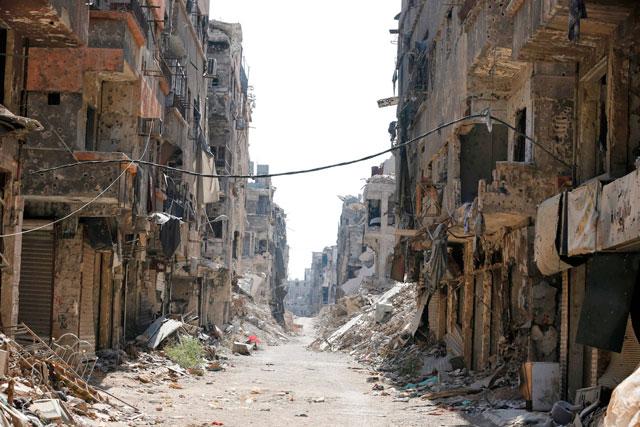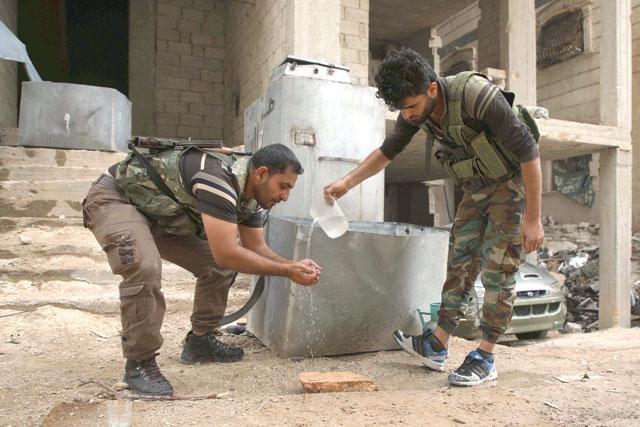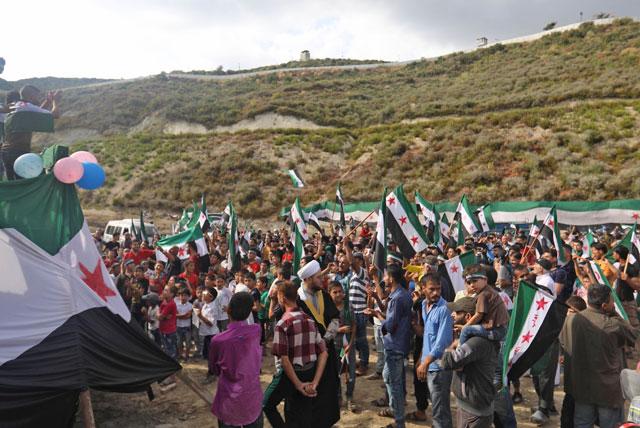You are here
Syria buffer free of heavy arms as extremists face deadline
By AFP - Oct 11,2018 - Last updated at Oct 11,2018

Destroyed buildings are seen in the Yarmouk Palestinian refugee camp in the Syrian capital Damascus as the regime began to clean the wreckage from the camp on Tuesday (AFP photo)
BEIRUT — A planned buffer zone in northwest Syria has been cleared of heavy armaments, Turkey said Wednesday, as a new deadline loomed for the tougher task of Ankara convincing extremists to pull out.
The demilitarised zone ringing the Idlib region is the result of a deal reached last month between rebel backer Turkey and government ally Russia to stave off a regime assault on Syria's last major rebel stronghold.
The accord called for a complete withdrawal of all heavy weapons from the planned buffer by Wednesday, and rebels and extremists appeared to have met that deadline.
"The pullout of heavy weapons from the de-militarised zone was completed on October 10," the Turkish defence ministry said.
Rami Abdel Rahman, who heads the Syrian Observatory for Human Rights, said no heavy weapons were visible in the buffer already from Tuesday.
He was unable to confirm any pullout from a part of the planned zone that falls inside Latakia province but said any such weaponry was not out in the open.
"They could have been moved to trenches or secret locations," he said.
The Turkey-backed National Liberation Front (NLF) rebel alliance said it had pulled out all heavy arms by Monday, and the observatory said extremists quietly followed suit.
Despite the relatively speedy implementation of the accord's first deadline, observers say a thornier task lies ahead.
Under the deal, the zone must be free by October 15 of all extremists, including those of Hayat Tahrir Al Sham (HTS), the region's dominant force led by former Al Qaeda fighters.
With five days to go, HTS and other extremist fighters remained inside the planned buffer area and showed no sign of leaving.
Harder point
HTS, which controls more than two-thirds of the planned zone, has not officially responded to the Turkey-Russia deal.
Haid Haid, an associate fellow at the Chatham House think-tank, said HTS had made the “pragmatic” move of pulling out its heavy weapons.
“Of course implementing the heavy weapons point is easier,” he said. “The harder point is withdrawing forces from the area.”
Syrian Foreign Minister Walid Muallem had expressed confidence in Turkey’s ability to fulfil its side of the deal “because of its knowledge of factions” on the ground.
HTS, extremists from the Turkestan Islamic Party (TIP) and current Al Qaeda outfit Hurras Al Deen control more than two-thirds of the planned buffer zone.
Many of HTS’s fighters have battled for years in Syria under various groups and are keen to keep their influence in the war-ravaged country’s largest remaining rebel bastion.
“HTS is playing the long game in Idlib,” said Nicholas Heras of the Centre for a New American Security.
“It is making the assessment that Turkey will allow it to continue to operate in northwest Syria, so long as HTS keeps a low profile,” he added.
“As long as HTS stays on Turkey’s good side, it has a golden opportunity to set permanent roots in Idlib,” Heras said.
Freeze the war
In recent weeks, Turkey has dispatched convoys of troops to monitoring posts in the region and its soldiers are expected to patrol any future buffer zone.
Forces loyal to President Bashar Assad have retaken large parts of Syria from opposition fighters and extremists since Russia intervened in September 2015.
After a series of victories near Damascus and in the south of the country earlier this year, a similar Moscow-backed assault had been expected against Idlib before the Russia-Turkey deal was announced.
Despite progress in implementing the accord, Assad insisted on Sunday it was a “temporary measure” and that Idlib would eventually return to state control.
Heras said Damascus and Moscow could use the grace period to focus on reconstructing Syria’s war-ravaged infrastructure.
“The Russians want to freeze the war in western Syria and get on with the business of rebuilding Assad’s zone of control,” he said.
“Assad might want to reconquer Idlib, but for now he does not have a better option than this deal,” he said.
The Syrian war has killed more than 360,000 people since it erupted in 2011 with the brutal repression of anti-government protests.
Related Articles
BEIRUT — A day after extremists missed a deadline under a demilitarisation deal for Syria's Idlib, key powerbroker Russia said the deal was
BEIRUT, Lebanon — The fate of Syria's Idlib will depend on Turkey's ability to keep a lid on the extremist-dominated tinderbox and prevent a
BEIRUT — Syrian rebels said Saturday they have begun withdrawing heavy arms from a planned buffer zone in north-western Idlib province, ahea
















